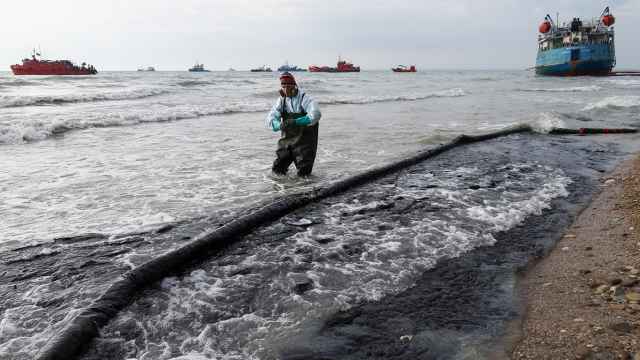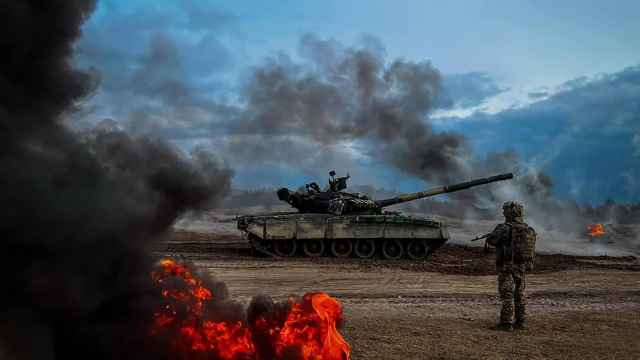U.S. Representative Buck McKeon's schoolmarmish scolding of President Vladimir Putin in his Sept. 17 comment in The Moscow Times, "Putin's New York Times Blunder," exemplified the arrogance that provoked Putin's critique of U.S. President Barack Obama's threatened war against Syria. The congressman forgot the preaching of Jesus as the cornerstone of peace and amity, "Let he who is without sin cast the first stone."
McKeon clucked: "History is on our side. … Make no mistake: It is the U.S. that has provided the strategic framework for stability and peace since World War II."
Amid U.S. Congressman Buck McKeon’s arrogant scolding of Putin and his starry-eyed reading of U.S. foreign interventions, he forgot to mention a long list of U.S. interventionist failures and abuses.
But history tells a less starry-eyed story of chronic U.S. interventions abroad with ulterior motives and grim consequences.
In 1953, the U.S. orchestrated the overthrow of Iran's democratically elected Prime Minister Mohamed Mossedeq in favor of the brutal and corrupt Shah of Iran to protect British oil interests. The shah yielded to an even more sinister theocracy in the 1979 Iranian Revolution. Tens of millions of Iranians have been killed, injured or oppressed because of Mossedeq's overthrow.
The U.S. sponsored the overthrow of Guatemala's Socialist President Jacobo Arbenz in 1953, which ushered in four decades of grisly military dictatorship and atrocities. More than 200,000 were killed or forcibly disappeared.
In 1961, the U.S. attempted the overthrow of Cuba's leader Fidel Castro in the ill-starred Bay of Pigs caper. Then came U.S. attempts at assassinating Castro and the Cuban missile crisis that brought the world to the edge of destruction.
The 1964 Gulf of Tonkin Resolution, which pivoted on false intelligence of a North Vietnamese torpedo attack on U.S. naval vessels, precipitated the Vietnam War on behalf of corrupt and unpopular South Vietnamese leaders. The war featured Agent Orange, napalm, hundreds of thousands of civilian deaths, death squads and tiger cages.
The U.S. invaded the Dominican Republic in 1965 during its civil war to fortify its "sphere of influence" in the Caribbean and to prevent a Communist victory.
In 1973, the U.S. encouraged a military coup against Chile's Salvador Allende by brutal dictator General Augusto Pinochet, who became notorious as a symbol of human rights abuse and corruption. More than 3,200 were executed or disappeared and scores of thousands were detained, tortured or exiled during Pinochet's rule. Then-National Security Adviser Henry Kissinger quipped, "I don't see why we need to stand by and watch a country go Communist due to the irresponsibility of its own people."
Recent U.S. wars against Iraqi leader Saddam Hussein and Libyan leader Moammar Gadhafi produced cures worse than the disease. Both nations are now bedeviled by sectarian, tribal and ethnic warfare with no end in sight.
McKeon retreats into his kennel instead of confronting the question: What benevolent outcome or consequences could be expected from a U.S. military intervention against Syria without the justification of self-defense or a United Nations Security Council resolution, which would be classified as aggression, a crime, under international law? If the U.S. launches another military intervention, this time in Syria, imagine the horrible consequences if an international precedent was set — if any country in the world was allowed to attack another country under the banners of "protecting human rights" and "humanitarian intervention." It would return the planet to a Hobbesian state of nature earmarked by a war of all against all.
McKeon's true quarrel is not with Putin. It is with the overwhelming majority of the American people and his fellow Republicans in Congress who adamantly oppose a gratuitous war against Syria.
Congressman McKeon should be sobered by the fact that Putin enjoys the same favorability rating with the American people as the U.S. Congress. And history is on the side of those who those who represent, not defy, the popular will.
Bruce Fein, author of "American Empire Before The Fall," is founder and president of the Commission on Intelligence and Foreign Wars.
A Message from The Moscow Times:
Dear readers,
We are facing unprecedented challenges. Russia's Prosecutor General's Office has designated The Moscow Times as an "undesirable" organization, criminalizing our work and putting our staff at risk of prosecution. This follows our earlier unjust labeling as a "foreign agent."
These actions are direct attempts to silence independent journalism in Russia. The authorities claim our work "discredits the decisions of the Russian leadership." We see things differently: we strive to provide accurate, unbiased reporting on Russia.
We, the journalists of The Moscow Times, refuse to be silenced. But to continue our work, we need your help.
Your support, no matter how small, makes a world of difference. If you can, please support us monthly starting from just $2. It's quick to set up, and every contribution makes a significant impact.
By supporting The Moscow Times, you're defending open, independent journalism in the face of repression. Thank you for standing with us.
Remind me later.






